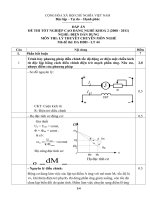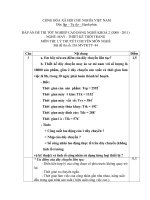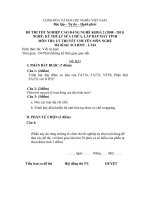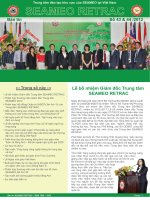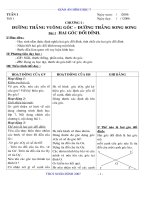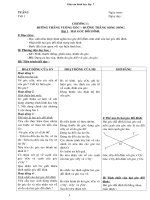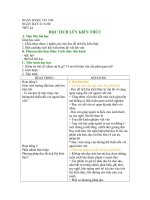PASSAGE 44
Bạn đang xem bản rút gọn của tài liệu. Xem và tải ngay bản đầy đủ của tài liệu tại đây (40.73 KB, 3 trang )
PASSAGE 44
The increase in international business and in foreign investment has created a need for executives with
knowledge of foreign language and skills in cross-cultural communication. Americans, however, have not
been well trained in either area and, consequently, have not enjoyed the same level in negotiation in an
international arena as have their foreign counterparts.
Negotiating is the process of communicating back and forth for the purpose of reaching an agreement.
Involves persuasion and compromise, but in order to participate in either one, the negotiators must
understand the ways in which people are persuaded and how compromise is reached within the culture of
negotiation.
In many international negotiations business abroad, Americans are perceived as wealthy and
impersonal. It often appears to the foreign negotiator that Americans represents a large multimillion–
dollar corporation that can afford to pay the price without bargaining further. The American negotiator’s
role became that of and impersonal purveyor of information and cash, the image that succeeds only in
understanding the negotiation.
In studies of American negotiators abroad, several traits have been identified that may serve to confirm
that stereotypical perception, while subverting the negotiator’s position. Two traits in particular that cause
cross-cultural misunderstanding are directness and impatience on that part of American negotiator.
Furthermore, American negotiators often insist on realizing short-term goals. Foreign negotiators, on the
other hand, may value the relationship established between negotiators and may be willing to invest time
in it for long-term benefits. In order to solidify the relationship, they may opt for indirect interactions
without regard for the time involved in getting to know the other negotiator.
Clearly, perceptions and differences in values affect the outcomes of negotiation and the success of
negotiators. For Americans to play a more effective role in international business negotiations, they must
put forth more effort to improve cross-cultural understanding.
Question 1. What’s the author main point ?
A. American negotiators need to learn more about other cultures.
B. Negotiation is the process of reaching an agreement.
C. Foreign perceptions of American negotiators are based on stereotypes.
D. Foreign languages are important for international business.
Question 2. According to the author, what is the purpose of negotiation ?
A. To undermine the other negotiator’s position
B. To reach an agreement
C. To communicate back and forth
D. To understand the culture of the negotiators
Question 3. The word “persuaded” in paragraph 2 is closest in meaning to ___________
A. informed
B. respected
C. convinced
D. accused
Question 4. The word “that” in paragraph 3 refers to :
A. role
B. corporation
C. price
D. bargaining
Question 5. Which of the following is mentioned as a criterion necessary for negotiation ?
A. participation
B. compromise
C. communication
D. investment
Question 6. According to the passage, how can the businesspersons improve their negotiation skills ?
A. By getting to know the negotiators
B. By explaining the goals more clearly
C. By living in a foreign culture
D. By compromising more often
Question 7. The American negotiators are described as all of the following EXCEPT :
A. known for direct interactions
B. interested in short-term goals
C. willing to invest time in relationships
D. perceived by foreign negotiators as wealthy
ĐÁP ÁN
1-A
2-B
6-A
7-C
3-C
4-A
5-B
LỜI GIẢI CHI TIẾT
Question 1:
Đáp án A. Dịch nghĩa : Ý chính của tác giả là gì ?
A.Những đàm phán viên Mỹ cần nghiên cứu nhiều hơn về những nền văn hố khác.
B. Đàm phán là q trình đạt được một thoả thuận
C. Những định kiến của nước ngoài về đàm phán viên Mỹ dựa trên sự rập khuôn.
D. Những ngơn ngữ nước ngồi là rất quan trọng cho kinh doanh quốc tế.
Question 2:
Giải thích : Đáp án nằm ở : “Negotiating is the process of communicating back and forth for the purpose
of reaching an agreement.”
(Đàm phán là quá trình giao tiếp qua lại để đạt được một sự thoả thuận. )
Dịch nghĩa : Theo tác giả, mục đích của đàm phán là gì ?
A. Để làm suy yếu vị thế của đàm phán viên đối tác
B. Để đạt được thoả thuận
C. Để giao tiếp qua lại
D. Để hiểu nét văn hoá của những đàm phán viên
Question 3:
Đáp án C. Giải thích : persuaded = convinced : thuyết phục
Question 4:
Dịch nghĩa : Vai trò của đàm phán viên Mỹ trở thành là một kẻ vô cảm cung cấp nguồn thông tin và tiền
mặt, và làm suy yếu những cuộc đàm phán.
Question 5:
Đáp án B. Giải thích : Đáp án nằm ở : “Involves persuasion and compromise, but in order to participate in
either one, the negotiators must understand the ways in which people are persuaded and how compromise
is reached within the culture of negotiation.”
(Liên quan đến việc thuyết phục và thoả hiệp, nhưng để tham gia vào một trong 2 cái đó, những nhà đấm
phán phải hiểu cách thức mà người ta bị thuyết phục và làm sao để đạt được một thoả hiệp trong một đàm
phán văn hoá. )
Như vậy những tiêu chuẩn có liên quan đến 1 đàm phán là sự thuyết phục và sự thoả hiệp.
Dịch nghĩa : Cái nào dưới đây là tiêu chuẩn cần thiết cho 1 đàm phán ?
A. sự tham gia
Question 6:
B. sự thoả hiệp
C. sự giao tiếp
D. sự đầu tư
Đáp án A. Giải thích : Đáp án nằm ở : “For Americans to play a more effective role in international
business negotiations, they must put forth more effort to improve cross-cultural understanding.”
(Đối với người Mỹ, để có đạt được những đàm phán kinh tế quốc tế hiệu quả hơn, họ cần nỗ lực hơn
trong việc cải thiện kiến thức đa văn hoá.) Dịch nghĩa : Theo bài văn, nhà kinh doanh có thể cải thiện kĩ
năng đàm phán bằng cách ?
A. Bằng cách hiểu nhiều hơn về đàm phán viên đối tác
B. Bằng cách giải thích mục tiêu một cách rõ ràng hơn
C. Bằng cách sống trong văn hoá nước ngoài
D. Bằng cách thoả hiệp nhiều hơn
Question 7:
Đáp án C. Giải thích : Đáp án nằm ở : “Two traits in particular that cause cross-cultural misunderstanding
are directness and impatience on that part of Amarican negotiator.”
(Hai đặc trưng cụ thể dẫn đến hiểu lầm đa văn hoá là sự thẳng thắng và thiếu kiên nhẫn của đàm phán
viên Mỹ.)
Như vậy có thể thấy, một đặc điểm của đàm phán viên Mỹ là họ thiếu kiên nhẫn, tức họ khơng sẵn lịng
đầu tư thời gian vào những mối quan hệ. Dịch nghĩa : Những đàm phán viên Mỹ được mô tả như những
điều sau ngoại trừ :
A. Được biết đến với những tương tác trực tiếp
B. Quan tâm đến mục tiêu ngắn hạn
C. Sẵn lòng đầu tư thời gian vào các mối quan hệ
D. Được coi là giàu có bởi những đàm phán viên nước ngoài

